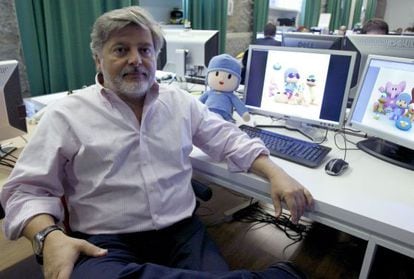Pocoyó: the cartoon wars
Two entrepreneurs are fighting it out for control of the popular children's show


Behind the apparent innocence of a cartoon character that has made its way on to many of the world's television sets, a bitter war is raging. Two businessmen - one Spanish, the other Mexican - are wrestling over control of a company that is mired in debt but well positioned in over 80 countries with its star product: Pocoyó, an animated character representing a little boy dressed in blue.
On Monday, the Spanish entrepreneur José María Castillejo issued a desperate-sounding statement that concluded thus: "We trust we will be able to keep developing our business, with God's help."
Castillejo is the president of Zinkia, the Madrid-based company that has produced the Pocoyó series since its creation a decade ago. Despite its runaway popularity, especially among preschoolers, Zinkia has lately been teetering on the verge of financial collapse.
The latest figures released by the company, which has been listed since July 2009, reveal debts of 14 million euros. On Wednesday, Zinkia formally filed for administration in a desperate bid to try to avoid complete bankruptcy.
But while the 52-year-old Castillejo - who holds seven nobility titles, including Knight of the Order of Malta - was being described by some shareholders as "suffering from delirium" and taking "a leap in the dark," another man named Miguel Valladares García, 55, was boarding a flight bound for the Mexican capital. He was taking with him the majority of the company's shares.
The Mexican entrepreneur is a little-known figure in Spain. According to his own resume, he has founded 30 companies in a variety of industries, including steel, real estate and the media. A father of three who is married to a journalist, Valladares has strong ties to Spain, since his grandfather was from León and his father from Madrid.
Before taking the plane back home, the Mexican entrepreneur had the following parting words: "I believe in the future of Zinkia and in Pocoyó's potential. I didn't come here to take away Mr Castillejo's job, but he himself has admitted to the bad results posted by Zinkia, where I have no wish to hold any paid or executive position."
Some shareholders describe Castillejo as "suffering from delirium" and taking "a leap in the dark"
"Management must be left in the hands of a professional who will act transparently, because the current manager has proven deficient," he added.
His move appeared to save shareholders from the horror of "losing everything" and "saying goodbye to a lifetime of savings." But for Castillejo, a former theology student in Rome and twice Grandee of Spain, it was a familiar feeling. In late 2013 he had an identical experience with Jomaca98 S.L., the company through which he managed his participation in Zinkia, and which also filed for administration.
And it wasn't the first time. Four years earlier he had taken Amelia Aran, a company specializing in children's furniture, to the brink of bankruptcy. Employees were left without their paychecks and the firm defaulted on Social Security payments. "It is normal for entrepreneurs to have debts," he says by way of explanation.

Castillejo and Valladares met in 2009 through third parties. That was the year that Zinkia went public, with an initial share value of 1.92 euros. These days, that figure is down to less than 0.5 euros. Wowed by Pocoyó's success and its plans to expand into China and the Americas, Valladares decided to invest in a big way. He bought a share package from Castillejo for four million euros, paying 3.20 euros per share and thus becoming the second biggest shareholder after the president, who held 64 percent of Zinkia. The Mexican businessman figured he would start seeing profits within the next five years.
But five years later, not only has he not seen a single euro in profits, he has actually invested a further three million even though the company is worth 20 million, down from 80 million in 2009.
Why did Valladares invest in a company that was losing money? And why was a company with a highly successful product going under? Pocoyó is a familiar program in dozens of countries, and the seven-minute episodes have been viewed over 1.45 billion times on Youtube.
The answer to these questions lies in the events of recent years. Castillejo, a father of six, blames everything on financial markets going dry on him and leaving him unable to meet his obligations. "When we made our plans for 2013 in 2011 we didn't think it would be so difficult," he admitted.
Castillejo, a father of six, blames everything on financial markets going dry on him
The shareholders were getting nervous, but Castillejo countered the bad results with enthusiastic proclamations about "relevant facts" that were about to take place sometime in the future. His statements were filled with expressions such as "the company is working on/negotiating/in the process of..." and so on. Ultimately, he appealed to God for assistance.
It is true that Castillejo attempted to raise capital in different ways. In October 2013, he tried to sell bonds that would pay the incredible interest of 11 percent (he would pay 1,100 euros for every 10,000 euros invested), but the CNMV securities watchdog warned potential buyers that "Zinkia has no liquidity."
Just a little earlier, in August 2013, Valladares discovered that Castillejo had requested a 16-million loan from Bankia in September 2009, that he had failed to return a single euro, and that as a result the bank was going to keep the deposit that Castillejo had provided as a guarantee to back up the loan. Part of this guarantee included 33 percent of Zinkia' shares.
That is when Valladares made the strategic decision ("for the first time in my life," he says) to buy back the debt that Bankia was offering for 2.9 million euros. It was a good deal: the Mexican became the main shareholder in the company for less than three million euros. But the power struggle was just beginning.
The businessman from Madrid had the legal right to try to outbid Valladares, but lacked the liquidity to do so. Far from giving up, however, this self-declared descendant of El Cid tried to stop the transaction and buy some time. That is the reason why, late last year, he pushed his company Jomaca98 S.L, which managed his majority share in Zinkia, into administration. The move ensured that he would retain the political rights over the 33 percent of shares tied to the loan, at least for as long as the courts took to resolve the issue.
Castillejo's last decision was taken last Wednesday, when he took Zinkia into administration after being unable to convince even his cousins at Santa María de los Peñotes Foundation, who had invested 2.5 million euros, to believe in him any longer.










































